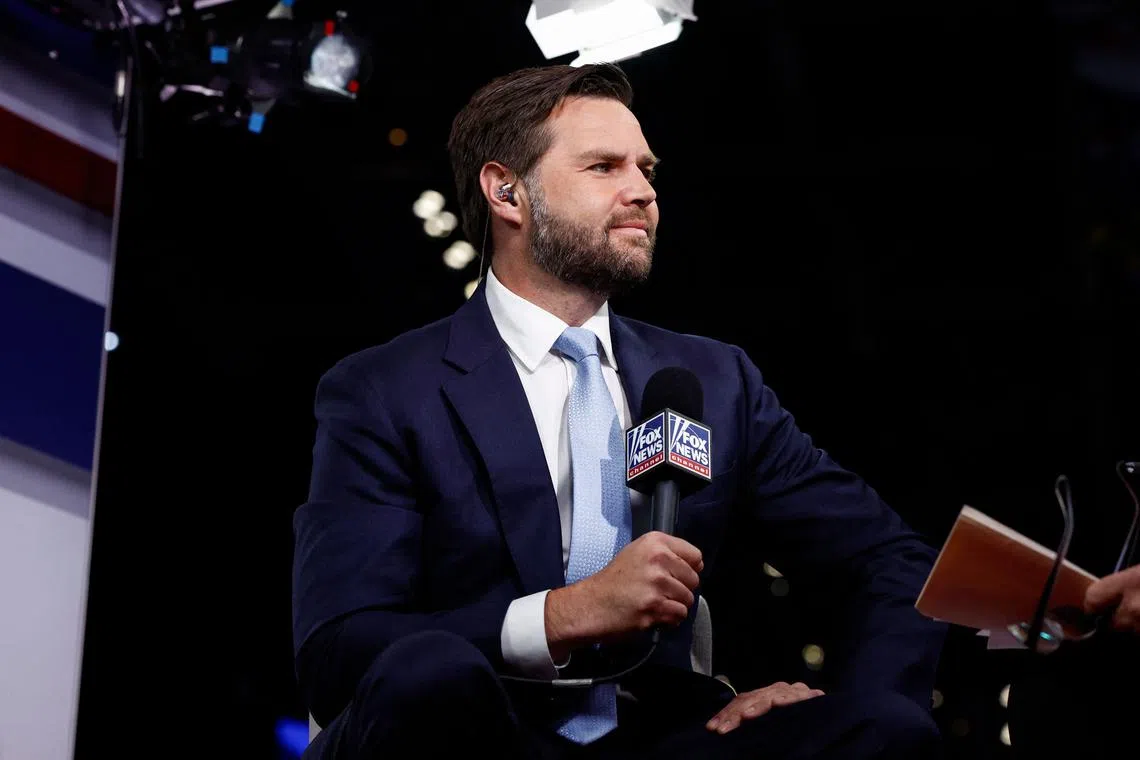Trump’s Vance pick widens rift with GOP’s foreign policy old guard
Sign up now: Get ST's newsletters delivered to your inbox

Republican vice-presidential candidate James David Vance preparing to give an interview on the first day of the Republican National Convention on July 15 in Milwaukee, Wisconsin.
PHOTO: AFP
MILWAUKEE – Former president Donald Trump’s choice of Mr James David Vance as his running mate
The first formal pick of his potential administration is a 39-year-old former Marine who voted against more military aid to Ukraine, wants to help Israel “finish the job” against Hamas, and argues that the US is “stretched too thin” overseas and should zero in on Asia to counter China.
His views mirror the rise of a new strain of policy shared by younger Republicans – and fuelled by Trump – that the old ways are out of date.
Their approach questions the one-time conventional wisdom that the US should seek primacy through leading global alliances, promote democracy and entice other nations to embrace American values.
“This is the first appointment he has made of his supposed second term,” Dr Ivo Daalder, the US ambassador to Nato under then President Barack Obama, said of Trump’s choice of Mr Vance.
“And it demonstrates that what he’s looking for is someone who affirms his views, not contradicts them, at least as far as it comes to Ukraine and Nato and foreign policy.”
More broadly, the pick signals that Trump has less interest in trying to reassure the party traditionalists he wooed in 2016.
In his first term, Trump surrounded himself with a group that came to be known as the adults in the room, appointees like former Exxon Mobil chief Rex Tillerson and retired general Jim Mattis. Sometimes, they openly resisted Trump’s directives. Other times, they quietly ignored them.
This time, Trump is openly breaking with the Republican Party’s defence establishment, such as his previous vice-president Mike Pence and Senate Minority Leader Mitch McConnell. The party is also known as the Grand Old Party (GOP).
Mr McConnell, who has announced he will not seek another term as his party’s leader, has waged a rhetorical fight against isolationist voices like Mr Vance’s, which he has likened to the “America First” movement that opposed aiding the UK and other allies before the attack on Pearl Harbour in 1941.
Mr McConnell was booed when he appeared before the Republican National Convention in Milwaukee on July 15, while Mr Vance got a rock star’s welcome when he came to the floor soon after Trump announced his pick.
Yet others set Mr Vance’s view firmly in a longer-term trend that dates back at least as far as Mr Obama – who championed a much-touted “pivot” to Asia.
“Ever since president Kennedy, the United States has been asking for Europe to do more,” UK politician David Lammy said in May, before he became foreign secretary with the Labour Party’s win in July.
“My friend, Senator Vance, is right to say we in Europe have a problem that we need to fix with higher defence expenditure.”
It is far too early to know how much Trump will listen to Mr Vance’s counsel if they win in November.
But if he does, the US will take an even more sceptical view towards Ukraine than Trump has expressed so far. The Ohio senator says he opposes any further aid to Ukraine and has pushed for peace as soon as possible.
“I think it’s ridiculous that we’re focused on this border in Ukraine,” Mr Vance once said on US political strategist Steve Bannon’s podcast. “I’ve got to be honest with you – I don’t really care what happens to Ukraine one way or the other.”
He adds to the voices around Trump who have made clear they will not push back against the former president’s scepticism, and might fuel it even more.
Another is Trump’s former ambassador to Germany, Mr Richard Grenell, who said at a Bloomberg News roundtable on July 15 that Ukraine’s territorial integrity should be preserved, but any deal should allow for “autonomous zones”, or areas where Russian-backed separatists retain control.
Mr Vance’s views would be a boon to Asian nations and Taiwan, which have warned about growing Chinese encroachment.
He has said that he is a “fan of Aukus”, the defensive alliance with the United Kingdom and Australia that looks to counter China with a boosted fleet of submarines as well as technology sharing.
“The choice of Vance shows the neoconservative, globalist holdouts in the GOP are pointless and politically powerless,” said Mr Christian Whiton, a State Department political appointee under presidents George W. Bush and Trump.
“Trump followed the mould of Bill Clinton and chose a candidate who reflected his views rather than balanced them out. This is bold and savvy.”
‘Tough nut’
Early reaction from allies that have benefited from President Joe Biden’s “America’s Back” approach reaffirmed a feeling that hung over last week’s Nato summit in Washington: Despite Mr Biden’s reassurances and Republicans’ insistence that Trump won’t pull out of the alliance, Europe is increasingly on its own.
“The nomination of @JDVance1 as V-P shows us in Europe that we must continue to make an effort to take greater care of European security and sovereignty ourselves,” German legislator Metin Hakverdi wrote on X. “Tough nut to crack.”
Mr Vance was welcomed by Republicans across the spectrum, but it garnered swift pushback from those who argue that peace negotiations now might let Russian President Vladimir Putin get away with the Ukraine invasion.
“To the extent a vice-president Vance would have any influence, he would unquestionably push president Trump in the direction of abandoning Ukraine,” said Dr Kori Schake, director of foreign and defence policy studies at the American Enterprise Institute.
“His views and adamancy will complicate alliance relationships, making more difficult garnering international support for policies that make America safe and prosperous.” BLOOMBERG


